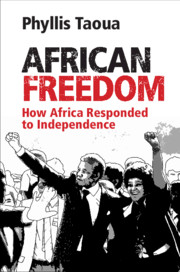Crossref Citations
This Book has been
cited by the following publications. This list is generated based on data provided by Crossref.
Nkhata, Bimo
2020.
The Palgrave Handbook of Climate Resilient Societies.
p.
1.
Nkhata, Bimo
2021.
The Palgrave Handbook of Climate Resilient Societies.
p.
413.
Umezurike, Uchechukwu P.
2022.
“Omelora”: Orthodox and Disciplinary Masculinities in Chimamanda Ngozi Adichie’sPurple Hibiscus.
Men and Masculinities,
Vol. 25,
Issue. 4,
p.
566.
Arenberg, Meg
2023.
Mohammed Khelef Ghassani’s “Kwetu”: poetry, place, and liberation.
Journal of the African Literature Association,
Vol. 17,
Issue. 1,
p.
49.
Armillas-Tiseyra, Magalí
2023.
Of freedom and the problem of the future in contemporary diasporic African speculative fiction.
Journal of the African Literature Association,
Vol. 17,
Issue. 1,
p.
132.
Taoua, Phyllis Clark
2023.
Of writing and freedom in Sony Labou Tansi’s novel Life and a Half.
Journal of the African Literature Association,
Vol. 17,
Issue. 1,
p.
151.
Coundouriotis, Eleni
2023.
Belonging and freedom in Ernest Cole’s The House of Bondage.
Journal of the African Literature Association,
Vol. 17,
Issue. 1,
p.
14.
Taoua, Phyllis Clark
and
Musila, Grace A.
2023.
Of freedom and literature in Africa and the diaspora.
Journal of the African Literature Association,
Vol. 17,
Issue. 1,
p.
1.
Mhlambi, Innocentia J.
2023.
Black liberation politics and quagmires in trans-Atlantic black operas.
Journal of the African Literature Association,
Vol. 17,
Issue. 1,
p.
112.
Musila, Grace A
2023.
Refusal and the American dream in Dinaw Mengestu’s oeuvre.
Journal of the African Literature Association,
Vol. 17,
Issue. 1,
p.
192.
Diabate, Naminata
2023.
(Digital) anthologies and genre: Writing sexual pleasure and poetic freedom.
Journal of the African Literature Association,
Vol. 17,
Issue. 1,
p.
87.





